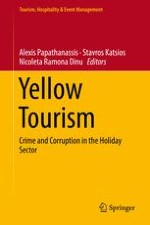2019 | OriginalPaper | Chapter
Informal Tourism Economy and EU Funding: The Case of Romania
Authors : Dragoș Dumitru Jaliu, Anamaria Sidonia Răvar
Published in: Yellow Tourism
Publisher: Springer International Publishing
Activate our intelligent search to find suitable subject content or patents.
Select sections of text to find matching patents with Artificial Intelligence. powered by
Select sections of text to find additional relevant content using AI-assisted search. powered by
